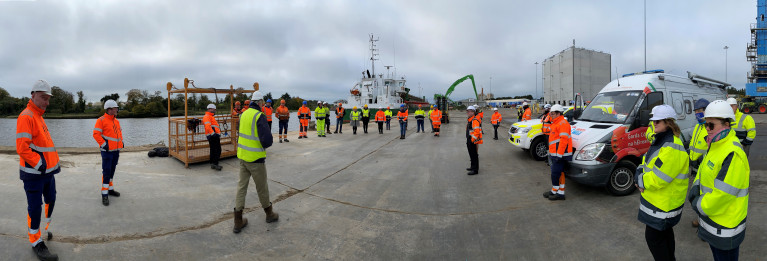Displaying items by tag: Golden Rules
Drogheda Port Participates in First Irish Port Safety Week
Irish port authorities including Drogheda Port, recently joined together through the Irish Ports Safety Forum in hosting the first Irish Port Safety Week which took place in the first week of from November.
The authorities had come together to ensure, highlight and enhance collective safety responsibility with events hosted under differing themes for each day of the safety week.
With a different theme for each day of the week, Drogheda Port put together a programme to educate and highlight the importance of PPE, traffic management, water safety and fire safety at the port, along with the Golden Rules of Drogheda Port.
“Drogheda Port Company were delighted to play its part in this inaugural Port Safety Week” said Paul Fleming, CE of Drogheda Port Company. “It was an opportunity to work collaboratively to improve safety and performance in the port sector, share experience and knowledge in order to drive continual improvement in eliminating accidents at work”.
With information sheets and fliers circulated every day, help was on hand from the Drogheda Fire Brigade and the Drogheda branch of the Irish Coastguard. Drogheda Fire Brigade attended a Major Port Evacuation Drill on Thursday and Fire Station Officer Mark McLearney along with his team outlined the role of the fire service in attending emergencies and offered real life examples and advice to the port community on how
best to deal and assist in emergency circumstances.
Drogheda’s Irish Coast Guard Unit attended on Friday and ICG Unit Operations Manager Commander Dermot McConneran and his team caried out a full Man Overboard Drill at Tom Roes Point with the attendance of their response RIB.
Captain Martin Donnelly, Harbourmaster of Drogheda Port thanked the emergency services for their attendance and participation at port safety week.
“On behalf of Drogheda Port Company, I would like to express our gratitude to the Drogheda Fire Brigade and the Drogheda Coast Guard for being so generous with their time during Port Safety Week.
Thanks to their demonstrations and talks all in Drogheda Port have learned a lot about the importance of fire safety and water safety at Drogheda Port.”
All at Drogheda Port considered this inaugural Port Safety Week to be a great success and wish to thank all the port users and employees for their participation and in making this week a success.





























































